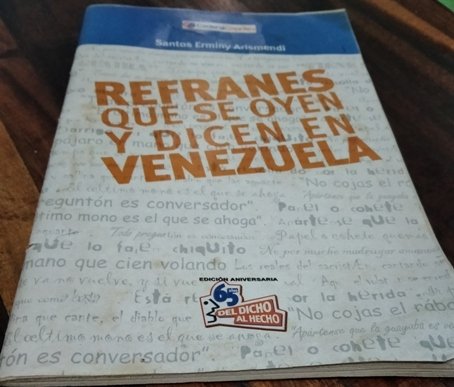

Con este refrán se trata de enfatizar, que sólo a quien aprecia o es dueño de algo, reclamará lo malo que suceda con esa propiedad u objeto. También puede servir para indicar la cercanía de una persona con otra, o para poner límite a un entrometido, todo depende del contexto en que se utilice.
Se resalta que la experiencia, los errores, nos dan conocimiento, pericia y habilidades para evitar equivocarnos a futuro.
Con este refrán se indica que si una persona desea conseguir algo, alcanzar una meta, lograr un objetivo, debe hacer las gestiones necesarias para ello, buscar lo que desea.
No sé si este refrán será venezolano, y si lo es, corresponde a un lugar en donde se siembren coles y lechugas, es decir, los estados Andinos de mi país; lo cierto es que con este refrán se intenta decir, que no todos los días son iguales, pues hay días malos (coles) y también días buenos (lechuga), que quizás sean menos frecuentes. Es un dicho que nos permite mantener la perspectiva de la vida, que lo único seguro que tiene, es que siempre cambia, no es constante.
Es similar al que dice: “Poco a poco se anda lejos” , y lo que trata de expresar, es que esforzándonos sin afán, pero de manera constante, podemos obtener muchos logros.



With this saying, it is about emphasizing that only those who appreciate or own something will claim the bad that happens with that property or object. It can also be used to indicate the closeness of one person to another, or to limit a busybody, it all depends on the context in which it is used.
It is highlighted that experience, mistakes, give us knowledge, expertise and skills to avoid making mistakes in the future.
With this saying it is indicated that if a person wants to achieve something, reach a goal, achieve an objective, he or she must makes the necessary arrangements for it, look for what he or she wants.
I don't know if this proverb is Venezuelan, and if it is, it corresponds to a place where cabbages and lettuce are grown, that is, the Andean states of my country; the truth is that with this proverb one tries to say that not all days are the same, because there are bad days (cabbages) and also good days (lettuce), which may be less frequent. It is a saying that allows us to maintain perspective on life, that the only sure thing is that it always changes, it is not constant.
It is similar to the one that says: "Little by little you go far" , and what it tries to express is that by making an effort without effort, but constantly, we can obtain many achievements.
.png)
Dear readers, I will post the links to number 65 below, in case you want to read it:
Víctor Vera Morales. (Agosto 2004). Refranes y Comidas de Venezuela. Editado por el Instituto Municipal de Publicaciones de la Alcaldía de Caracas.
Santos Erminy Arismendi. (2006). Refranes que se oyen y dicen en Venezuela. Cadena Capriles, Caracas. Venezuela.
- Fotos de mi autoría, tomada con un teléfono REDMI 8A, intervenida con WordArt / Photos of my authorship, taken with a REDMI 8A telephone, intervened with WordArt.
- Los diseños incluidos en esta publicación, han sido elaborados por mi persona con la aplicación CANVA / The designs included in this publication has been made by me with the CANVA application.
In the event that it is required to use the content or images of this post and my other publications, I would be grateful if my authorship (Fabiola Martínez) was made and the corresponding link was cited. Thank you.

 Delegations welcome!
Delegations welcome!






